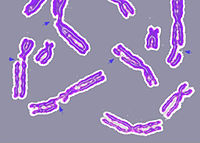
Correlation of gemcitabine sensitization by Chk1 inhibition with p53 status.
Sign Up to like & getrecommendations! Published in 2022 at "Journal of chemotherapy"
DOI: 10.1080/1120009x.2022.2082350
Abstract: AbstractsChk1 inhibition can selectively improve gemcitabine sensitivity in p53-deficient cells by checkpoints abrogation throughout the cell cycle. However, the dependency of p53 status is still controversial for predicting the priority of such synergy. This study… read more here.
Keywords: inhibition; chk1; p53 status; gemcitabine ... See more keywords

Human papillomavirus and p53 status define three types of vulvar squamous cell carcinomas with distinct clinical, pathological, and prognostic features.
Sign Up to like & getrecommendations! Published in 2023 at "Histopathology"
DOI: 10.1111/his.14925
Abstract: INTRODUCTION Based on their etiological relationship with human papillomavirus (HPV), the 2020 WHO classification has divided vulvar squamous cell carcinomas (VSCC) into two distinct types, HPV-associated and HPV-independent, and HPV-independent tumours have recently been divided… read more here.
Keywords: vscc; hpv independent; p53 status; p53 ... See more keywords

Abstract 3748: p53 status as a determinant of functional duality of estrogen receptor beta in breast cancer: Therapeutic implications
Sign Up to like & getrecommendations! Published in 2018 at "Cancer Research"
DOI: 10.1158/1538-7445.am2018-3748
Abstract: Whether estrogen receptor beta (ERβ) is a pro- or anti-oncogenic protein in breast cancer has been controversial. ERβ levels are high in ERα negative cancers including triple-negative breast cancer (TNBCs). Recent reports including the Cancer… read more here.
Keywords: mut p53; breast cancer; p53 status; cancer ... See more keywords

Study on Molecular Information Intelligent Diagnosis and Treatment of Bladder Cancer on Pathological Tissue Image
Sign Up to like & getrecommendations! Published in 2022 at "Frontiers in Medicine"
DOI: 10.3389/fmed.2022.838182
Abstract: Background Molecular information about bladder cancer is significant for treatment and prognosis. The immunohistochemistry (IHC) method is widely used to analyze the specific biomarkers to determine molecular subtypes. However, procedures in IHC and plenty of… read more here.
Keywords: bladder cancer; molecular subtypes; p53 status; status ... See more keywords